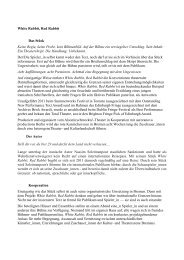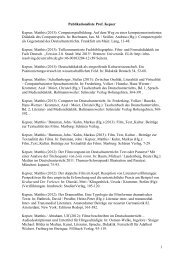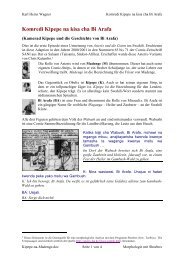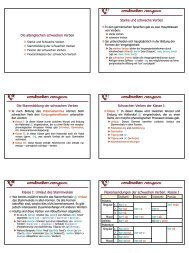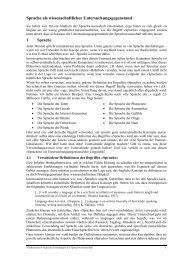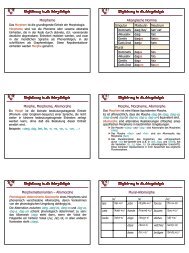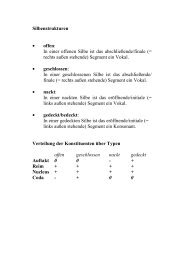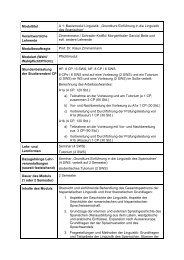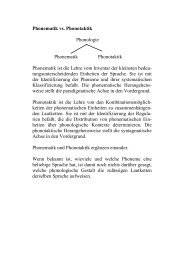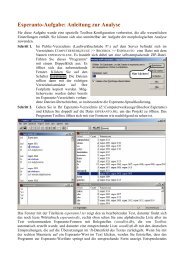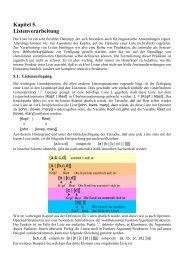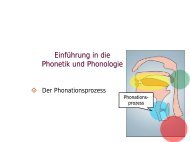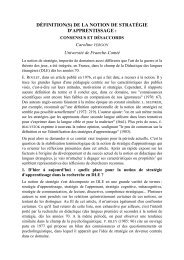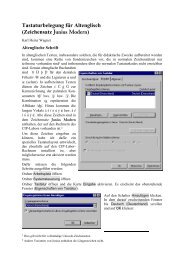Relativism and Universalism in Linguistics - Fachbereich 10 ...
Relativism and Universalism in Linguistics - Fachbereich 10 ...
Relativism and Universalism in Linguistics - Fachbereich 10 ...
You also want an ePaper? Increase the reach of your titles
YUMPU automatically turns print PDFs into web optimized ePapers that Google loves.
<strong>10</strong>6 Sections<br />
Language-specific profil<strong>in</strong>g <strong>and</strong> conceptual representations<br />
Carroll, M. / Lambert, M. / Starren, M. / Schmiedtová, B. / v.Stutterheim, C.<br />
University of Heidelberg, Germany / University of Paris X, France / Radboud University, The<br />
Netherl<strong>and</strong>s / University of Heidelberg, Germany<br />
m_starren@hotmail.com<br />
Cross-l<strong>in</strong>guistic studies of Semitic (Modern St<strong>and</strong>ard Arabic), Germanic (English, German,<br />
Dutch, Norwegian), Romance (French, Italian, Spanish), <strong>and</strong> Slavic languages (Russian,<br />
Czech) reveal language-specific patterns when select<strong>in</strong>g <strong>and</strong> encod<strong>in</strong>g <strong>in</strong>formation. The<br />
underly<strong>in</strong>g pr<strong>in</strong>ciples are both perspective driven <strong>and</strong> l<strong>in</strong>ked to grammaticisation. The<br />
empirical f<strong>in</strong>d<strong>in</strong>gs relate to systematic cross-l<strong>in</strong>guistic comparisons carried out on a<br />
typological basis. They focus on the grammatical categories tense, aspect, syntactic subject,<br />
word order, <strong>and</strong> their implications <strong>in</strong> connect<strong>in</strong>g syntax, semantics, <strong>and</strong> <strong>in</strong>formation structure.<br />
The analyses <strong>in</strong>clude<br />
• cross-l<strong>in</strong>guistic differences <strong>in</strong> event construal<br />
• cross-l<strong>in</strong>guistic differences <strong>in</strong> express<strong>in</strong>g the contrast specific versus generic<br />
• language-related differences <strong>in</strong> speech onset times<br />
• eye movement when process<strong>in</strong>g the visual <strong>in</strong>put for verbalisation<br />
For event representation <strong>and</strong> time-event relations the f<strong>in</strong>d<strong>in</strong>gs reveal language-specific<br />
patterns of event construal which are grammatically determ<strong>in</strong>ed. Contrasts manifested <strong>in</strong><br />
l<strong>in</strong>guistic form can be l<strong>in</strong>ked to differences <strong>in</strong> the process<strong>in</strong>g of <strong>in</strong>formation for verbalisation.<br />
The cross-l<strong>in</strong>guistic comparisons show that speakers of languages from different cultures, but<br />
with similar grammaticised means, follow similar preferences <strong>in</strong> event representation.<br />
The f<strong>in</strong>d<strong>in</strong>gs demonstrate that the opposition relative versus universal oversimplifies the picture.<br />
There is surely a level at which human cognition can be characterised <strong>in</strong> universal terms (the<br />
dist<strong>in</strong>ction between ‘static’ <strong>and</strong> ‘dynamic’, for example), but concepts coded <strong>in</strong> language as<br />
developed over time, however, are not adequately captured by these primitives <strong>and</strong> require<br />
another degree of differentiation. They form well-def<strong>in</strong>ed clusters <strong>in</strong> which basic concepts are<br />
organised <strong>in</strong> a specific manner. The differences are reflected <strong>in</strong> their applicability across various<br />
doma<strong>in</strong>s <strong>in</strong> that they lead to language-specific constra<strong>in</strong>ts <strong>in</strong> use – even though they may <strong>in</strong>clude<br />
similar conceptual components (e.g. the aspectual dist<strong>in</strong>ctions ‘ongo<strong>in</strong>g’ or ‘completion’).<br />
Differences at the level of cluster<strong>in</strong>g as well as differences <strong>in</strong> doma<strong>in</strong>s of application lead to<br />
language-specific profiles <strong>in</strong> conceptualisation <strong>and</strong> language use. Further evidence comes from<br />
studies of ultimate atta<strong>in</strong>ment <strong>in</strong> very advanced adult second language acquisition. They show that<br />
a given profile, taken <strong>in</strong> its entirety, is not fully accessed by the learner.<br />
Iconic motivation <strong>in</strong> grammatical categories:<br />
Questions for Cognitive Grammar<br />
Glynn, Dylan<br />
University of Leuven<br />
dsglynn@paris7.jussieu.fr<br />
Us<strong>in</strong>g found-data <strong>in</strong> English, Dutch <strong>and</strong> German, this study exam<strong>in</strong>es the proposal of iconic<br />
motivation for grammatical categories. Tak<strong>in</strong>g lexical concepts from the doma<strong>in</strong> of weather<br />
terms, concepts that would be most likely to <strong>in</strong>teract with iconic structures <strong>in</strong> a predictable<br />
manner, we exam<strong>in</strong>e the productivity of grammatical category - lexeme comb<strong>in</strong>ation <strong>and</strong> test<br />
the hypothesis of iconic motivation <strong>in</strong> grammar.



